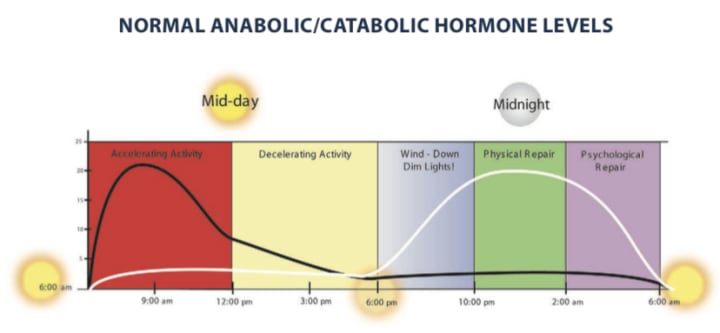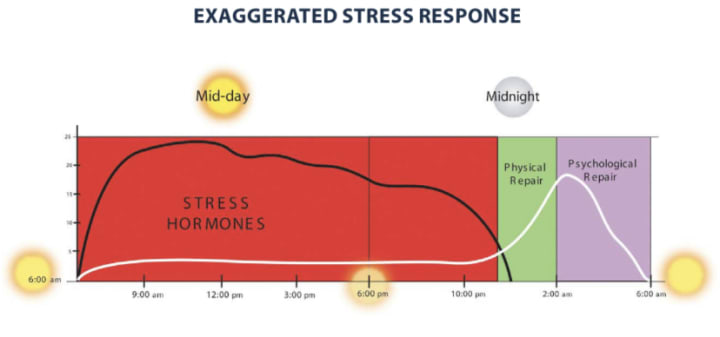How Stress Affects The Sleep Cycle
The Importance of getting quality sleep.

7049 Taylorsville Road Suite A,
Huber Heights, OH 45424
937-233-1755
By: Nicco Libertini- Holistic Health Practitioner
October 01, 2020

The picture above depicts a normal circadian rhythm in the human body. The black line represents the cortisol production, while the white line represents melatonin production. Cortisol and melatonin are inversely related, so when cortisol production is high in the body, then melatonin production is low. In our normal circadian rhythm picture we see cortisol, our fight or flight/awake hormone, is high during the morning/afternoon hours. As the afternoon/evenings continues, cortisol begins to drop as melatonin begins to raise. Melatonin is our rest and rebuild hormone that is vital for mental and muscle recovery, as well as a plethora of other functions.
Around 10pm is when physical repair begins. This is when the body repairs any muscle damage or wounds through the use of hormones such as DHEA, growth hormone, estrogen, and testosterone. The metabolism is controlled, and the immune system is repaired throughout this time as well. From 2am till 6am is when psychological repair begins. In this time frame the hormones are balanced and the sympathetic nervous system is depressed by the parasympathetic nervous system.

Your cortisol and melatonin production can be disrupted by a number of factors. This could be as simple as having caffeine before bed, or as complex as leaky gut syndrome. Whatever the cause may be, it can have a huge impact on your sleep quality as well as sleep quantity. When your body is in a sympathetic (stressed) state, your cortisol levels are elevated due to your body being in a survival state. The elevated cortisol will take a couple hours to decline. This means, even when you are asleep during that physical repair time frame of the circadian rhythm, your body won’t be able to repair.
Conversely, if you are too parasympathetic (relaxed), you will also have poor sleep quality as well. This could be as simple as not getting enough movement throughout your day, or as complex as adrenal exhaustion. Some of the major issues of being too parasympathetic are excessive digestion, hibernation, depression and nervousness. If you don’t have enough stress in your life, it can be just as detrimental to your sleep as having too much stress!
In conclusion, stress plays a huge role in not only our sleep, but also the recovery of our physical and mental state. We need to take the proper steps to improve, educate, and maintain our sleep quality, because without sleep our body will slowly destroy itself. As I wrap up this blog I’ll ask this question. What are you doing to maintain your quality of sleep, and how can you improve? If you want to have a structured process to get better sleep, you can call to book an appointment with me!
About the Creator
Nicco Libertini
CHEK Holistic Health Practitioner/Personal trainer dedicated to providing as much FREE information to better educated the importance of a healthy lifestyle!






Comments
There are no comments for this story
Be the first to respond and start the conversation.